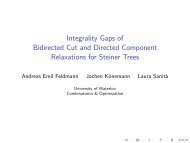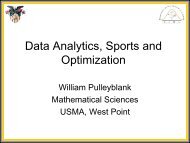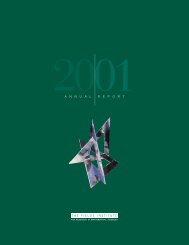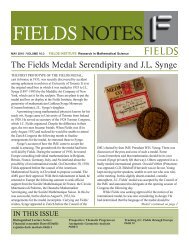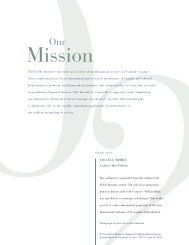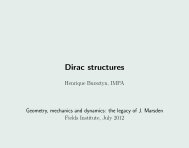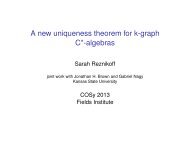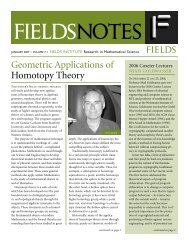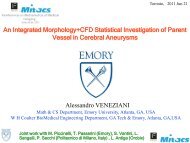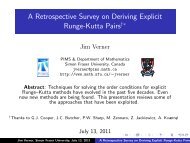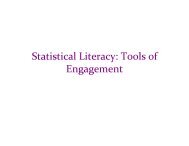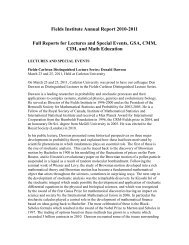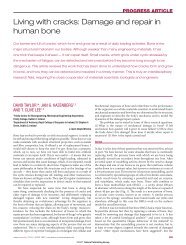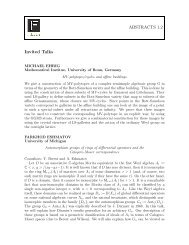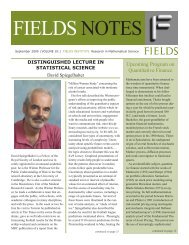Annual Report 2005 - Fields Institute - University of Toronto
Annual Report 2005 - Fields Institute - University of Toronto
Annual Report 2005 - Fields Institute - University of Toronto
You also want an ePaper? Increase the reach of your titles
YUMPU automatically turns print PDFs into web optimized ePapers that Google loves.
and former president <strong>of</strong> the International Environmetrics<br />
Society. The other invited lectures were given by Richard<br />
Cook (Waterloo), Ross Cressman (Wilfried Laurier),<br />
Gerarda Darlington (Guelph), David Earn (McMaster), Igor<br />
Jurisica (Ontario Cancer <strong>Institute</strong>), Lindi Wahl (UWO)<br />
and Jianhong Wu (York). All the lectures were <strong>of</strong> very high<br />
quality and generated many discussions.<br />
To promote and to facilitate networking among researchers,<br />
an extended poster session was held during the symposium.<br />
All participants – in particular students – were encouraged<br />
to present their research during this poster session. The<br />
posters addressed important interdisciplinary questions<br />
related to food safety, urban development and nest site locations,<br />
prediction <strong>of</strong> pregnancy, and bi<strong>of</strong>ilms. The winner<br />
<strong>of</strong> the Best Graduate Poster Competition was Judith Toms<br />
<strong>of</strong> the Department <strong>of</strong> Statistics and Actuarial Sciences at<br />
the <strong>University</strong> <strong>of</strong> Waterloo, for her poster “Modeling the<br />
Factors Influencing Choice <strong>of</strong> Nest Site Location in Wood<br />
Thrush”, jointly done with Lyle Friesen (Canadian Wildlife<br />
Service), Virgil Martin (City <strong>of</strong> Waterloo) and Jock MacKay<br />
(<strong>University</strong> <strong>of</strong> Waterloo). The selection committee consisted<br />
<strong>of</strong> Dr. Daniel Kobler <strong>of</strong> TM Bioscience, <strong>Toronto</strong>, and<br />
Roderick Melnik, Canada Research Chair in Mathematical<br />
Modeling at Wilfrid Laurier <strong>University</strong>. The Committee<br />
based its decision on the two major criteria <strong>of</strong> novelty <strong>of</strong> the<br />
problem and the advancement <strong>of</strong> knowledge in the context<br />
<strong>of</strong> the life sciences, and close interactions between mathematical/statistical<br />
sciences and the life sciences, including<br />
realistic experimental data.<br />
The event was co-sponsored by the <strong>Fields</strong> <strong>Institute</strong>, and the<br />
Department <strong>of</strong> Mathematics and Statistics, the Office <strong>of</strong><br />
Research and the Faculty <strong>of</strong> Environmental Science <strong>of</strong> the<br />
<strong>University</strong> <strong>of</strong> Guelph, and SHARCNET (The Shared Hierarchical<br />
Academic Research Computing Network).<br />
Invited Speakers:<br />
Richard Cook (Waterloo)<br />
Assessing association with clustered and truncated disease<br />
onset data<br />
Ross Cressman (Wilfrid Laurier)<br />
Co-evolution, adaptive dynamics and the replicator equation<br />
for a continuous trait space<br />
Gerarda Darlington (Guelph)<br />
Analysis <strong>of</strong> pretest-posttest data in cluster randomization<br />
trials<br />
G e n e r a l S c i e n t i f i c A c t i v i t i e s<br />
David Earn (McMaster)<br />
The capacity <strong>of</strong> modern cities to resist infectious disease invasions<br />
A.H. El-Shaarawi (National Water Research Inst. &<br />
McMaster)<br />
Modelling and analyzing spatial-temporal environmental<br />
data<br />
Igor Jurisica (Ontario Cancer Inst.)<br />
Avoiding fusion <strong>of</strong> illusion and confusion integrated computational<br />
biology<br />
Lindi Wahl (UWO)<br />
Information theory reveals functional domains in proteins<br />
Jianhong Wu (York)<br />
Modelling spatio-temporal patterns in biological invasion and<br />
diseases spread<br />
Resolutions, Inverse Systems, and Co-invariants<br />
January 13–15, <strong>2005</strong><br />
Held at the <strong>University</strong> <strong>of</strong> Ottawa<br />
Organizers: Riccardo Biagioli (UQAM), Sara Faridi<br />
(Ottawa), and Mercedes Rosas (York)<br />
The purpose <strong>of</strong> this meeting was to bring together researchers<br />
from two different mathematical communities, namely<br />
commutative algebraists and algebraic combinatorialists.<br />
It was a continuation <strong>of</strong> the successful meeting that took<br />
place a year before at Queen’s <strong>University</strong>. That meeting<br />
highlighted several connections between similar techniques<br />
used by algebraic combinatorialists and commutative algebraists<br />
to study different problems. The Queen’s meeting<br />
led to collaborations among several <strong>of</strong> the participants on<br />
Workshop participants<br />
<strong>Fields</strong> <strong>Institute</strong> <strong>2005</strong> ANNUAL REPORT 69



